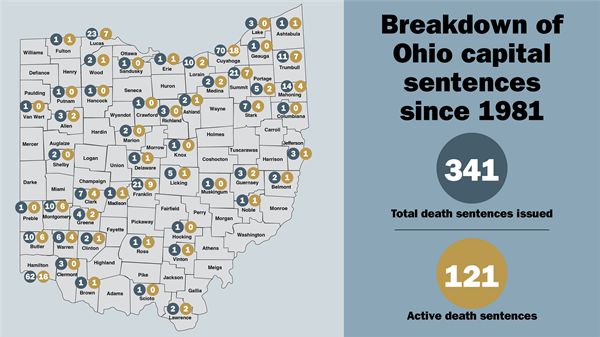(COLUMBUS, Ohio) — With the release today of the “2023 Capital Crimes Report,” Attorney General Dave Yost reiterated his call for Ohio’s elected leaders to address the state’s costly and ineffective capital-punishment system.
“No criminal penalty – capital or otherwise – should carry an empty promise of justice,” Yost said. “Ohioans on both sides of the death-penalty debate can agree that our current system of capital punishment is unworkable, and something needs to change.”
The Capital Crimes report, an annual statutory requirement of the Attorney General’s Office, provides the procedural history and other information on every case that has resulted in a death sentence since Ohio’s death-penalty law was enacted in 1981.
From 1981 through Dec. 31, 2023, the report says, 336 people have received a combined 341 death sentences. Of those, only 56 sentences – just one in every six – have been carried out. The state last carried out an execution on July 18, 2018 – more than five years ago.
Currently in Ohio, there are 119 Death Row inmates with a combined 121 death sentences pending throughout the state.
Click here to view active cases and data by region
On average in Ohio, a condemned inmate spends more than 21 years on Death Row – mostly due to the numerous avenues for appeal – before an execution date is set. Also contributing to delays is the reluctance of pharmaceutical suppliers to provide lethal-injection drugs for executions.
In January, Yost and two state lawmakers proposed a solution to the drug impasse, announcing legislation to permit the use of nitrogen hypoxia as an alternative to lethal injection. The announcement followed the Jan. 25 execution in Alabama of murderer Kenneth Eugene Smith – the first time that a state used nitrogen, a colorless and odorless gas, in an execution.
With no other clear path forward, the report says, scores of Ohio families who have lost loved ones to brutal violence are left to wonder whether they will ever have closure.
That frustration is all too familiar to the family of Esther Cook and her 12-year-old daughter, Ashley, who were murdered in their Warren home in 1999. Their killer, Stanley “Ted” Adams, was sentenced to death in 2001 but has evaded justice, remaining on Death Row more than 22 years later.
Adams has twice had his execution rescheduled, ostensibly because the state cannot obtain the drugs necessary to carry out the sentence. His execution is now set for Feb. 19, 2025, but if the current impasse continues, there is no guarantee that it will be carried out then, either.
“You don’t really know until it happens to you – the severity and the impact – and how much it changes your heart, mind and soul,” said Kimberly Cook, who was 16 when her mother and sister were murdered. “And the fact that there is no justice is worse.”
Yost writes in the report that Ohio needs to find the political will to make capital punishment an effective tool for justice.
“Esther and Ashley Cook have been dead for 24 years, but their condemned killer is still waking up for breakfast every morning, courtesy of Ohio’s taxpayers,” he said. “Ohio’s elected leaders should fix this.”
The 2023 Capital Crimes Report is available on the attorney general’s website.

MEDIA CONTACT:
Dominic Binkley: 614-728-4127
-30-